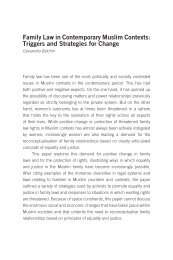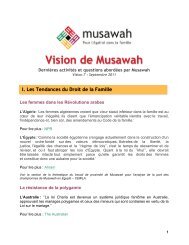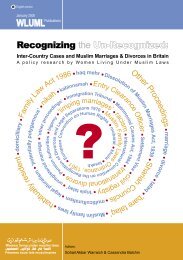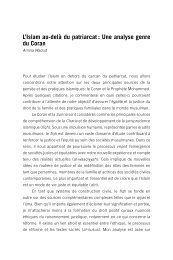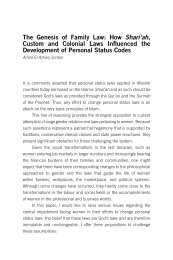Muslim Family Laws in Pakistan - Musawah
Muslim Family Laws in Pakistan - Musawah
Muslim Family Laws in Pakistan - Musawah
Create successful ePaper yourself
Turn your PDF publications into a flip-book with our unique Google optimized e-Paper software.
Part A: Introduction<strong>Muslim</strong> <strong>Family</strong> <strong>Laws</strong> <strong>in</strong> <strong>Pakistan</strong>Research and Written By:Rukhshanda Naz and Maliha ZiaAurat FoundationThe development of <strong>Muslim</strong> <strong>Family</strong> <strong>Laws</strong> <strong>in</strong> <strong>Pakistan</strong> may be perceived though differentperiods of time and political <strong>in</strong>fluences on legislation. The <strong>Muslim</strong> Jurisprudence was<strong>in</strong>troduced <strong>in</strong> 712 A.D, but the legal system was established at the end of 12th century.The legal system <strong>in</strong> the Indian subcont<strong>in</strong>ent before the British Rule was based on Shariahwith even the Mughal Emperors tak<strong>in</strong>g the role of judiciary. This <strong>Muslim</strong> jurisprudencecont<strong>in</strong>ued to be used for formal adm<strong>in</strong>istration of justice system dur<strong>in</strong>g British Rule. Thepresent day situation of family laws <strong>in</strong> <strong>Pakistan</strong> is a mixture of codified law and customarylaw based on religious norms. The codified Muhammedan law clearly def<strong>in</strong>es <strong>Muslim</strong>personal laws accord<strong>in</strong>g to predom<strong>in</strong>ant School of Thoughts i. e. Sunni & Shia, however,the Shariat Application Act laid down that <strong>in</strong> <strong>Muslim</strong> family matters, the rule of decisionwould be <strong>Muslim</strong> personal law. A substantial portion of personal law, therefore, rema<strong>in</strong>edun-codified and subject to <strong>in</strong>terpretation by the courts. Fac<strong>in</strong>g a situation of <strong>in</strong>equality,discrim<strong>in</strong>ation and <strong>in</strong>security, both <strong>in</strong> codified and un-codified law, women begandemand<strong>in</strong>g law reform.After the formation of the Commission on Marriage and <strong>Family</strong> <strong>Laws</strong> <strong>in</strong> 1955, itsrecommendations were accepted <strong>in</strong> a diluted form and the <strong>Muslim</strong> <strong>Family</strong> <strong>Laws</strong>Ord<strong>in</strong>ance (MFLO) was promulgated <strong>in</strong> 1961. Its ma<strong>in</strong> aim was to discourage polygamyand regulate divorce. While the law also ensured the right of <strong>in</strong>heritance of grand childrenand provided for procedures and much needed documentation of marriages and divorces, itdid not grant women any substantive rights. Despite the good ‘<strong>in</strong>tentions’ to provideprotection to women <strong>in</strong> the realm of family law, the law, along with the others cont<strong>in</strong>ues tohave lacunas that discrim<strong>in</strong>ate aga<strong>in</strong>st women and did not measure up to the expectationsof the women who had struggled on its behalf. Commissions set up <strong>in</strong> 1975 1 , 1985 2 and1994 3 all proposed further recommendations, some of which were <strong>in</strong>corporated <strong>in</strong>to thelaw sporadically, <strong>in</strong>clud<strong>in</strong>g amendments <strong>in</strong> 4 MFLO, 1961 and 5 WPFCA, 1964; but noattempt was made to address the issues comprehensively. Thus the ga<strong>in</strong>s made were onlymarg<strong>in</strong>al and family laws cont<strong>in</strong>ued to rema<strong>in</strong> discrim<strong>in</strong>atory to women.Amendments made to the <strong>Family</strong> Courts Act <strong>in</strong> 2002 proved to be a lot more positive.Concrete and welcomed changes were made to make it easier for women to get a ‘khula’with<strong>in</strong> a specified time-period, and courts are now mandated to complete a case of divorceand other related issues such as ma<strong>in</strong>tenance and guardianship with<strong>in</strong> six months.1 <strong>Pakistan</strong> Women’s Rights Committee2 <strong>Pakistan</strong> Commission on the Status of Women3 Commission of Inquiry for Women4 - The <strong>Muslim</strong> <strong>Family</strong> <strong>Laws</strong> Ord<strong>in</strong>ance, 19615 -West <strong>Pakistan</strong> <strong>Family</strong> Court Act, 1964
<strong>Muslim</strong> family laws prevail<strong>in</strong>g <strong>in</strong> the country may be divided <strong>in</strong>to 15 categories asmentioned below:• The Divorce act, 1869• The Special Marriage Act, 1872• The Birth, Deaths and Marriages Registration Act, 1886• The Guardians and Wards act, 1890• The Marriages Validation Act, 1892• The Foreign Marriages Act, 1903• Child Marriage Restra<strong>in</strong>t Act, 1929• The Dissolution of <strong>Muslim</strong> marriages Act, 1939• The <strong>Muslim</strong> <strong>Laws</strong> Ord<strong>in</strong>ance, 1961• West <strong>Pakistan</strong> Rules Under The <strong>Muslim</strong> <strong>Family</strong> <strong>Laws</strong> Ord<strong>in</strong>ance, 1961• West <strong>Pakistan</strong> <strong>Family</strong> Court Act, 1964• West <strong>Pakistan</strong> <strong>Family</strong> Court Rules, 1965• Dowry and Bridal Gifts (Restriction) Act, 1976• Dowry and Bridal Gifts (Restriction) Rules, 1976The over-arch<strong>in</strong>g issue that persists throughout all the legislation is the prejudicial aspectof family laws for women, as the constitution of most of them is based on strongpatriarchal values, where the husband always has a dom<strong>in</strong>at<strong>in</strong>g position and the concept ofthe ‘husband’ as the sole provider; head of the family and household; and hav<strong>in</strong>g the rightof restoration of conjugal as compared to wife. A woman’s personal status with<strong>in</strong> thefamily directly impacts her status at all other levels, s<strong>in</strong>ce her rights <strong>in</strong> the public andprivate sphere are <strong>in</strong>extricably l<strong>in</strong>ked. If she is not recognized as an equal with<strong>in</strong> thefamily and rema<strong>in</strong>s vulnerable <strong>in</strong> terms of her personal and f<strong>in</strong>ancial security, a womencannot freely make decisions concern<strong>in</strong>g her own life or participate equally with men <strong>in</strong>other arenas of public life, even if she is given equal social and political rights.Keep<strong>in</strong>g this <strong>in</strong> m<strong>in</strong>d, the biggest contention with the law of divorce and ma<strong>in</strong>tenance isthat while giv<strong>in</strong>g men this ‘power’, it also leaves space for them to walk away fromresponsibilities i.e. if wife wants to cont<strong>in</strong>ue liv<strong>in</strong>g with her husband, he may reject herplea to live together and leave her destitute without any obligations of ma<strong>in</strong>tenance orsupport beyond the three month iddat post-divorce period. In a society like <strong>Pakistan</strong>,where women usually do not work, nor have the necessary qualifications to atta<strong>in</strong>employment, they are mostly left dependent on their own families who, also reserve thechoice as to whether they wish to accept them or not – the idea be<strong>in</strong>g that once a womanleaves her home for her husband's home, she ceases to belong to her parents household.Furthermore, a woman is considered a burden and divorce shameful, which results <strong>in</strong>many families refus<strong>in</strong>g to aid or assist the divorced woman.The Guardianship 6 laws also give an <strong>in</strong>ferior position to the mother as automatic guardian<strong>in</strong> absence of father, although concept of natural guardian has been changed. Women, ass<strong>in</strong>gle parents, have to seek the permission of court to be able to become so. As aconsequence the law gives unilateral freedom to men, and women to be left dependent andvulnerable.6 Guardians and Wards Act, 1890
Furthermore, the implementation of law aga<strong>in</strong>st polygamy; child marriage; the m<strong>in</strong>imumage of marriage of the girl; and citizenship for a foreigner husband 7 are still crucial issues.The religious political parties and groups with support of conservative religious scholarsalways <strong>in</strong>fluence and effectively block any positive attempt for progressive legislation oramendment.It therefore rema<strong>in</strong>s a fact, that women rema<strong>in</strong> vulnerable under the current regime of<strong>Muslim</strong> family laws, whether under legislation or the <strong>in</strong>formal personal law, both of whichare <strong>in</strong>fluenced by custom and traditions and the patriarchal <strong>in</strong>terpretation of religion.Part B – Equality and Justice are necessaryThe family laws <strong>in</strong> <strong>Pakistan</strong> are meant to be accord<strong>in</strong>g to Islamic pr<strong>in</strong>ciples. Although<strong>Pakistan</strong> primarily follows the Hanafi school of thought, there are overtones of pr<strong>in</strong>ciplesfrom other schools. The family laws operate under a set of 15 categories, as mentioned <strong>in</strong>Part A, and through years of case law precedents that have shaped and given furtherdef<strong>in</strong>ition to the legislation. The ma<strong>in</strong> laws such as the <strong>Muslim</strong> <strong>Family</strong> Law Ord<strong>in</strong>ance(MFLO) 1961 and Dissolution of <strong>Muslim</strong> Marriages Act through judicial <strong>in</strong>terpretationand amendments <strong>in</strong> other related laws, have become out-dated and are <strong>in</strong> dire need to begiven clear <strong>in</strong>terpretation and understand<strong>in</strong>g <strong>in</strong> light of the current day scenarios.The law, be<strong>in</strong>g given shape through case law, has highly patriarchal overtones and has, asa result, a discrim<strong>in</strong>ately effect on women and children. The MFLO was promulgated withthe <strong>in</strong>tention of provid<strong>in</strong>g women with safety aga<strong>in</strong>st arbitrary divorce, first wives fromnon-consensual and lack of knowledge of second marriage etc, however, while deal<strong>in</strong>gwith actual cases, judgments cont<strong>in</strong>ue to give discrim<strong>in</strong>atory and varied verdicts, result<strong>in</strong>g<strong>in</strong> confusion as to what is applicable and leav<strong>in</strong>g space for manipulation and violation ofthe rights of specifically women. A number of contentious and discrim<strong>in</strong>atory clausesrema<strong>in</strong> <strong>in</strong> the legislation <strong>in</strong>clud<strong>in</strong>g the right to contract a second marriage. While this hasbeen made illegal <strong>in</strong> many other <strong>Muslim</strong> countries, it rema<strong>in</strong>s legal and <strong>in</strong> fact the onlycondition is to <strong>in</strong>form and receive consent from the first wife. Not atta<strong>in</strong><strong>in</strong>g consent orlett<strong>in</strong>g the first wife know does not make the marriage illegal and <strong>in</strong> fact only has a verynom<strong>in</strong>al punishment.The biggest issue that has arisen relate to the requirement of apply<strong>in</strong>g to the ArbitrationCouncil for the divorce certificate and the requirement of 90 days iddat period: theprocedural method as opposed to the ‘Islamic’ method. This has resulted <strong>in</strong> two differentstreams of case law with no f<strong>in</strong>al and clear <strong>in</strong>dication as to which should prevail. The caseof Allah Rakha 8 , which asks this specific question, has been challenged <strong>in</strong> the SupremeCourt, but the judgment has been delayed for a number of years.Ma<strong>in</strong>tenance for the wife lasts only for 3 months. In a patriarchal country like <strong>Pakistan</strong>,where women do not usually atta<strong>in</strong> the necessary level of education, nor work and devotetheir lives to their families, when they are divorced, unless their families are will<strong>in</strong>g orable to support them, they are left distraught and penniless. A woman’s work <strong>in</strong> the home7 Shafrifan vs Federation of <strong>Pakistan</strong> , PLD 1998,Lahore.8 Allah Rakha vs Federation of <strong>Pakistan</strong>, PLD, 2000, FSCI.
is not recognized as ‘labour’ nor is it considered as a measurable amount, which can becompensated by the husband.Inheritance has rema<strong>in</strong>ed a central issue for women and girls <strong>in</strong> <strong>Pakistan</strong>. <strong>Family</strong> disputesalways settled on the basis of personal laws of the parties but right of <strong>in</strong>heritance is stillmatter of prevail<strong>in</strong>g tradition of the families, especially the <strong>in</strong>heritance regard<strong>in</strong>gagriculture land. While follow<strong>in</strong>g the Islamic procedure – many women are robbed of theirrightful <strong>in</strong>heritance.Guardianship is often awarded to the father has often he has the means to ‘ma<strong>in</strong>ta<strong>in</strong>’ thechildren, as opposed to the mother who may not be able to earn etc. Furthermore, theguardianship, if awarded to the mother is often challenged and given to the father <strong>in</strong> eventof the mother re-marry<strong>in</strong>g, as it means the <strong>in</strong>troduction of another man <strong>in</strong> the household.There are also cases of guardianship awarded to the grandfather <strong>in</strong> absence of father. Thisis a highly discrim<strong>in</strong>atory practice.Part C: Equality and Justice are possibleAs mentioned above, the amendments made <strong>in</strong> the <strong>Family</strong> Courts Act 2002 have shown apositive change. These amendments came after years of struggle from the women’smovement and <strong>in</strong>clude a number of recommendations forwarded by Aurat Foundation <strong>in</strong>2000 and years of advocacy, especially <strong>in</strong> collaboration with the Law and JusticeCommission of <strong>Pakistan</strong>.Although these recommendations have been applauded and welcomed, it is not nearlyenough. Aurat Foundation has cont<strong>in</strong>ued to take up the agenda of amendments <strong>in</strong> the<strong>Muslim</strong> family laws. In the year 2007 – 2008, it has re-<strong>in</strong>itiated the movement andorganized a national work<strong>in</strong>g group meet<strong>in</strong>g <strong>in</strong> August 2008 to discuss six of the laws andthe nikahnama (marriage deed). The participants <strong>in</strong>cluded some of the most em<strong>in</strong>entlawyers and jurists from across the country. The recommendations were f<strong>in</strong>alized by a 2ndwork<strong>in</strong>g group held <strong>in</strong> October 2008 and shared with civil society <strong>in</strong> the country throughnation-wide sem<strong>in</strong>ars. The recommendations are due to be shared with the M<strong>in</strong>istry ofWomen’s Development and M<strong>in</strong>istry of Law with<strong>in</strong> the com<strong>in</strong>g month. Some of therecommendations are mentioned below:• The laws should extend to the whole of <strong>Pakistan</strong> and not exclude the Tribal Areas• At least one <strong>Family</strong> Court <strong>in</strong> each District shall be presided over by a woman Judge. Noperson shall be appo<strong>in</strong>ted as a Judge of a <strong>Family</strong> Court unless she/he is or has been or isqualified to be appo<strong>in</strong>ted as a District Judge, an Additional District Judge, a Civil Judgewith a three year stand<strong>in</strong>g.• A pla<strong>in</strong>t for dissolution of marriage may conta<strong>in</strong> all claims relat<strong>in</strong>g to dowry, ma<strong>in</strong>tenance,dower, personal property and belongs of wife, custody of children and visitation rights ofparents to meet their children.• Provided that notwithstand<strong>in</strong>g any decision or judgment of any Court or Tribunal, the<strong>Family</strong> Court <strong>in</strong> a suit for dissolution of marriage on the sole ground of Khula, ifreconciliation fails, shall pass decree for dissolution of marriage forthwith and determ<strong>in</strong>e,the amount of dower, if any, and restore the same to the husband..• An application for permission to contract an additional marriage as provided <strong>in</strong> sub-sectionSection 6 of the <strong>Muslim</strong> <strong>Family</strong> <strong>Laws</strong> Ord<strong>in</strong>ance, 1961, shall be submitted <strong>in</strong> such manner
and <strong>in</strong> such form as is prescribed under the rules. The application shall conta<strong>in</strong> all thematerial facts as prescribed under the rules.• The consent to the proposed marriage, <strong>in</strong> whatever form, the Judge shall meet the wifeseparately <strong>in</strong> chamber and satisfy himself that her consent has been voluntarily and freelygiven, right of own residences, f<strong>in</strong>ancial status and dower.• No permission for contract<strong>in</strong>g a child marriage shall be given unless the <strong>in</strong>tend<strong>in</strong>g spouses,or the child or children for whose marriage the permission is be<strong>in</strong>g sought, are present andhave been heard by the Court.• The <strong>in</strong>terim ma<strong>in</strong>tenance and <strong>in</strong> the f<strong>in</strong>al decision <strong>in</strong> a suit for ma<strong>in</strong>tenance, the Court shallsimultaneously direct the husband or father, as the case may be, to pay the entire decreedamount with<strong>in</strong> one month and fix a schedule for future ma<strong>in</strong>tenance, fail<strong>in</strong>g which ten percent penalty shall be charged for every month of delay <strong>in</strong> payment. If the husband as thecase may be, fails to deposit the lump sum amount, he shall be liable to punishment forimprisonment of any description for any term, which may extend to one year, or with f<strong>in</strong>e,which may extend to twenty thousand, or both. The proper age of bride accord<strong>in</strong>g to lawshould be eighteen years and punishment suggested for violation of law. These areimprisonments of either description for a term for a m<strong>in</strong>imum of 1 year and may extend tofive years and with f<strong>in</strong>e which may extend to twenty-five thousand rupees, or with both, ifthe bride is less than sixteen years of age; and imprisonment of either description for aterm for a m<strong>in</strong>imum of 16 months and may extend to three years or with f<strong>in</strong>e which mayextend to twenty thousand rupees, or with both, if the bride is more than sixteen but lessthan eighteen years of age, and the requisite permission from the Court has not beenobta<strong>in</strong>ed.• Punishment for solemnis<strong>in</strong>g a child marriage – Whoever, performs, conducts or directsany child marriage shall, unless he proves that he had reason to believe that the marriagewas not a child marriage, be punishable with imprisonment of either description for a termof m<strong>in</strong>imum n<strong>in</strong>e months and may extend to three years and with f<strong>in</strong>e which may extendto twenty thousand rupees, or with both, if the child is less than sixteen years of age; andimprisonment of either description for a term of m<strong>in</strong>imum three months and may extend toone year, or with f<strong>in</strong>e which may extend to ten thousand rupees, or with both, if the childis more than sixteen but less than eighteen years of age, and the requisite permission fromthe Court, has not been obta<strong>in</strong>ed. Punishment for parents or guardian concerned <strong>in</strong> a childmarriage, either description of a term of m<strong>in</strong>imum n<strong>in</strong>e months and may extend to threeyears, and with f<strong>in</strong>e which may extend to twenty thousand rupees, or with both, if the childis less than sixteen years of age; and imprisonment of either description for a term ofm<strong>in</strong>imum three months and may extend to one year, or with f<strong>in</strong>e which may extend to tenthousand rupees, or with both, if the child is more than sixteen but less than eighteen yearsof age, and the requisite permission from the Court has not been obta<strong>in</strong>ed.• The court should ensure right of divorce, where the whereabouts of the husband have notbeen known for period of two year; husband has neglected or has failed to provide for herma<strong>in</strong>tenance for a period of one year; the husband has been sentenced to imprisonmentfor a period of three years or upwards; that the husband has failed to perform, withoutreasonable cause, his marital obligations for a period of one year; the husband wasimpotent at the time of the marriage and cont<strong>in</strong>ues to be so; or has been medically declaredsterile. Drug addict or has been medically declared <strong>in</strong>sane, or is suffer<strong>in</strong>g from leprosy or avirulent venereal disease; Frequently assaults her or makes her life miserable by cruelty ofconduct leads an <strong>in</strong>famous life, if he has more wives than one, does not treat her equitably;• A decree passed on ground of Khula shall not take effect for a period of three months fromthe date of such decree, and if the husband appears either <strong>in</strong> person or through anauthorised agent with<strong>in</strong> that period and satisfies the Court that he is prepared to performhis conjugal duties, the court shall set aside the said decree;
• Rights to dower, Ma’ta and ma<strong>in</strong>tenance not to be affected:- Noth<strong>in</strong>g conta<strong>in</strong>ed <strong>in</strong> this Actshall affect any rights which a married woman may have under <strong>Muslim</strong> law to her doweror any part thereof, Ma’ta, ma<strong>in</strong>tenance or other benefits on the dissolution of her marriageIn November 2008, the Council of Islamic Ideology (CII), a constitutional body responsible forgiv<strong>in</strong>g legal advice on Islamic issues to the <strong>Pakistan</strong> Government and the Parliament, published alist of recommendations relat<strong>in</strong>g to <strong>Muslim</strong> family laws. The Council recommended that a writtendivorce demanded by a woman would take legal effect <strong>in</strong> case the husband fails to oblige after 90days. It was also recommended that divorce papers shall also be registered as the Nikahnama(marriage deed) is filled under the law. Any divorce must be registered with the state authorities<strong>in</strong> written form have proper legal status. It has recommended that the bridegroom willdeclare his assets at the time of his first wedd<strong>in</strong>g and give complete details of his first wifeand children <strong>in</strong> nikahnama when enter<strong>in</strong>g <strong>in</strong>to a second marriage. Similarly, the Councilrecommends that declaration of first divorce announced by the husband would beregistered, follow<strong>in</strong>g which the second and third declaration would seal the fate ofmarriage. Another clause will be added <strong>in</strong> nikahnama by which the husband will assignright of divorce to the wife. Regard<strong>in</strong>g performance of Hajj by women without a Mehramthe Council said that under the Constitution and other laws of land women can freelytravel <strong>in</strong>land and abroad and there is no restriction <strong>in</strong> this regard. Furthermore, therecognition of the woman’s right of mata (ma<strong>in</strong>tenance of the wife until re-marriage ordeath) as an Islamic concept. The CII has based its recommendations on a large number ofresearch papers and Islamic texts. These revolutionary recommendations have beenapplauded by civil society, but religious parties have claimed them to be un-Islamic.Nevertheless, the CII is <strong>in</strong> the process of conduct<strong>in</strong>g discussions on theserecommendations before pass<strong>in</strong>g them onto the Government and Parliament.Methodology:Civil Society <strong>in</strong> <strong>Pakistan</strong> has made significant headway work<strong>in</strong>g with the governmentrelat<strong>in</strong>g to pro-women bill such as the <strong>Family</strong> Courts Amendment Act 2002, Crim<strong>in</strong>al Law(Amendment) Act 2004 – the Honour Kill<strong>in</strong>gs Act – The Protection of Women Act 2006 –amend<strong>in</strong>g the Hudood Ord<strong>in</strong>ances. Although civil society will not call them as completelaws and therefore, not complete successes, it is notable that women’s issues are be<strong>in</strong>grecognized and the voice of civil society is not just considered only a nuisance, but aspressure groups, demand<strong>in</strong>g the government to act. The announced <strong>in</strong>troduction of theSexual Harassment <strong>in</strong> the Work Place bill by the government <strong>in</strong> the near future is also tobe noted, as well as its collaboration with civil society. It is encourag<strong>in</strong>g to see thatwoman’s needs and rights are be<strong>in</strong>g given recognition.Aurat Foundation (AF), along with several partner organizations, legal personalities andactivists, has been campaign<strong>in</strong>g for many years for amendments <strong>in</strong> the out-dated andredundant provisions of the different legislations that deal with <strong>Muslim</strong> family laws,<strong>in</strong>clud<strong>in</strong>g the confus<strong>in</strong>g <strong>Muslim</strong> <strong>Family</strong> <strong>Laws</strong> Ord<strong>in</strong>ance, the archaic Child MarriageRestra<strong>in</strong>t Act and the Dissolution of <strong>Muslim</strong> Marriages Act.
The methodology used so far <strong>in</strong>cludes a number of work<strong>in</strong>g group meet<strong>in</strong>gs on therelevant legislation that have <strong>in</strong>cluded the participation of some of the country’s top legalexperts <strong>in</strong>clud<strong>in</strong>g a former Chief Justice: Nasir Aslam Zahid, two of the country’s firsthigh court female judges: Justices (retd.) Nasira Iqbal and Justice (retd.) Majida Rizvi, andthe current Secretary of the Law and Justice Commission of <strong>Pakistan</strong>: Dr. Faqir Hussa<strong>in</strong>.The groups analyse the law clause by clause and then present recommendations foramendments on the laws that have been presented to larger groups, as well as to thegovernment, members of parliament, stand<strong>in</strong>g committees etc. As mentioned above, anumber of these amendments have been <strong>in</strong>corporated <strong>in</strong>to the <strong>Family</strong> Court Act 2002, butthere rema<strong>in</strong>s a need for further and more comprehensive amendments.There is a constant need to keep up-dated the recommendations, keep<strong>in</strong>g <strong>in</strong> view ofchang<strong>in</strong>g legislation and case law that may directly or <strong>in</strong>directly affect the status of thefamily laws. Consequentially, <strong>in</strong> 2008, a drive to amend the family laws was once aga<strong>in</strong>started with the new democratic government tak<strong>in</strong>g its place. Under the auspices of AF, anational work<strong>in</strong>g group meet<strong>in</strong>g was conducted on 6 August 2008 <strong>in</strong> Islamabad to reanalysethe set of laws on the basis of an up-dated version of previous recommendations,authored by Dr. Faqir Hussa<strong>in</strong>. The house discussed <strong>in</strong> detail clauses that need to beamended to facilitate women seek justice <strong>in</strong> matters related to marriage, divorce, ‘khula,’ma<strong>in</strong>tenance and discourag<strong>in</strong>g practice of child marriages. After a day long detaileddiscussion, a set of recommendations was agreed upon and a smaller work<strong>in</strong>g group wasdesignated to f<strong>in</strong>alize the set of recommendations.Accord<strong>in</strong>gly, the work<strong>in</strong>g group meet<strong>in</strong>g was held on 29 October 2008 <strong>in</strong> Karachi and<strong>in</strong>cluded the participation of a number of the country’s top legal m<strong>in</strong>ds. After detaileddiscussion and analyses, recommendations for four of the acts were f<strong>in</strong>alized. Theserecommendations have been shared with larger groups <strong>in</strong>clud<strong>in</strong>g representatives of thegovernment, other political parties and the M<strong>in</strong>istry of Women’s Development and Law <strong>in</strong>the different regions of <strong>Pakistan</strong> for further discussion and adoption. After collaborationwith various stakeholders, these recommendations will soon be presented to thegovernment.Part D: Needs• Advocacy and Tra<strong>in</strong><strong>in</strong>g• Tra<strong>in</strong><strong>in</strong>g of tra<strong>in</strong>ers on law, <strong>in</strong>ternational obligations, constitution, comparativestudies• Further understand<strong>in</strong>g on progressive <strong>in</strong>terpretation of Islam, gender and law• Experience-Shar<strong>in</strong>g• Comparative Analysis of other <strong>Muslim</strong> countries and lawsPart E: ResourcesAurat Publication and Information Service Foundation (AF) is a civil society organisationcommitted to women’s empowerment through enabl<strong>in</strong>g their active participation <strong>in</strong>governance at all levels. For this purpose, the Foundation has def<strong>in</strong>ed its niche as a sourceof <strong>in</strong>formation to women and to undertake advocacy on their behalf with the state andsociety. The Foundation further believes that an enabl<strong>in</strong>g environment for enhanc<strong>in</strong>g thisshift towards women’s greater role <strong>in</strong> governance is an <strong>in</strong>fluential support network at the
local level for address<strong>in</strong>g women’s immediate concerns, and a larger social and politicalframework that facilitates a more active role for citizens <strong>in</strong> the affairs of the country.Therefore, the Foundation also works with citizens’ organisations and groups to strengthentheir capacity to take <strong>in</strong>itiatives to resolve women’s problems at the local level and to playa role <strong>in</strong> promot<strong>in</strong>g more accountable governance and participatory democracy <strong>in</strong> thecountry. It has emerged as a major support organisation for civil society organisations,governments and political parties, among other public and private <strong>in</strong>stitutions, andpresently it has one of the largest citizens’ networks <strong>in</strong> the country, with an outreachextend<strong>in</strong>g to all 110 districts of <strong>Pakistan</strong> and three districts of AJK. It is also a found<strong>in</strong>gmember of national and regional coalitions of NGOs, <strong>in</strong>clud<strong>in</strong>g 9 PNF & CORIN, and civilsociety forums, like WAF and JAC, is cont<strong>in</strong>u<strong>in</strong>g to represent common concerns andshared vision of civil society organisations on crucial development and human rightsissues.Due to its commitment to ideology of women’s empowerment cont<strong>in</strong>ues to provide<strong>in</strong>spiration to rank and file of the organisation, the AF has come to be recognisednationally and <strong>in</strong>ternationally as a major NGO <strong>in</strong> the country committed to work<strong>in</strong>g forwomen’s rights with a broad vision, political consciousness and <strong>in</strong>tellectual vigour. One ofits biggest programmes has been work<strong>in</strong>g on legal rights of women. With this background,some of the resources AF could provide are summarized below:Legal ExpertiseAF has developed a great legal <strong>in</strong>sight <strong>in</strong>to the issues related to <strong>Muslim</strong> family laws due tothis <strong>in</strong>volvement <strong>in</strong> the reform process. This experience of participat<strong>in</strong>g <strong>in</strong> this process,along with the detailed analyses, especially keep<strong>in</strong>g pr<strong>in</strong>ciples of gender equality <strong>in</strong> m<strong>in</strong>d,has resulted <strong>in</strong> AF be<strong>in</strong>g considered a legal expert and the organisation tak<strong>in</strong>g the lead <strong>in</strong>legal reform.Progressive OutlookAF has always, and cont<strong>in</strong>ues to have a progressive outlook on family matters e.g. itsstance on polygamy, a woman’s right of divorce, the legal age of marriage etc. Along withthis outlook, AF has a huge resource of reports, discussions and <strong>in</strong>formation on thesematters.Resource PersonsThrough its cont<strong>in</strong>ued <strong>in</strong>volvement <strong>in</strong> legal analyses and reform, AF has worked with alarge panel of lawyers, legal experts, jurists, as well as Islamic scholars and Islamic legalscholars on issues of law and religion. Along with the members of the organization,members of these panels are constantly part of all AF work and are part of its resources.Experience on work<strong>in</strong>g with Governments9 - <strong>Pakistan</strong> NGO Forum, Coalition of Rawalp<strong>in</strong>di Islamabad NGOs, Women Action Forum, Jo<strong>in</strong>t ActionCommittee
AF has been <strong>in</strong> existence s<strong>in</strong>ce 1986 and has cont<strong>in</strong>uously worked with the Government ofthe day, whether democratic or military, striv<strong>in</strong>g to make actual amendments <strong>in</strong> thediscrim<strong>in</strong>atory laws. Some of its ‘successes’ <strong>in</strong>clude, as mentioned above, thepromulgation of the Crim<strong>in</strong>al Law Amendment Act 2004, mak<strong>in</strong>g ‘honour kill<strong>in</strong>gs’ illegal,the Protection of Women Act 2007, amend<strong>in</strong>g the Hudood Ord<strong>in</strong>ances, the reserved seatsfor women <strong>in</strong> the local government (33%) and federal government (17%) and theformation of the National Commission on the Status of Women (NCSW). These have beenthe result of years of advocacy, lobby<strong>in</strong>g, build<strong>in</strong>g l<strong>in</strong>kages with the Governments,opposition members and government bodies and personnel. Although civil society doesnot regard these as ‘full’ successes as there rema<strong>in</strong> a number of lacunas <strong>in</strong> the law, the factthat rema<strong>in</strong> that <strong>in</strong> terms of out-look and progress, these are huge steps and successes. TheAF, along with the rest of civil society cont<strong>in</strong>ues to work with today’s PPP government onthese <strong>in</strong>itiatives and others, <strong>in</strong>clud<strong>in</strong>g the promulgation of a Domestic Violence Bill(DVB). This long-stand<strong>in</strong>g <strong>in</strong>volvement with the Government has placed AF <strong>in</strong> a strongposition when work<strong>in</strong>g with the Government, which has proved to be extremely useful.The AF’s work at creat<strong>in</strong>g this l<strong>in</strong>kage will also be shared with partners <strong>in</strong> hope offurther<strong>in</strong>g and replicat<strong>in</strong>g this relationship.(Ends)



